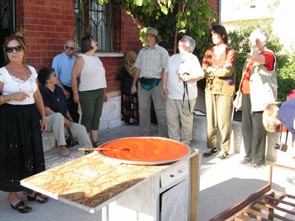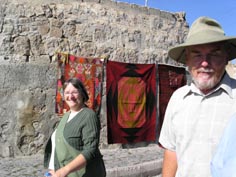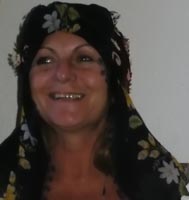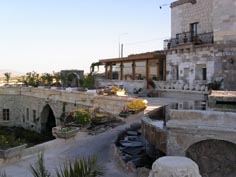|
9/12/05 Day Six CAPPADOCIA
Visited a
family in a rock house. They can be inherited. Always has a place for guests
reflecting the communal nature of Turkish society. Few branches can warm up
the stone house even in winter when there is snow. Walls are decorated
primarily with kilims.
The one
in this house was from Eastern Turkey and the wool is thinner. Grandma used
to spin their own wool.
  Family
planning is available. Military service is compulsory. Men hear about family
planning there. Most families have only two children; except Eastern Turkey. Family
planning is available. Military service is compulsory. Men hear about family
planning there. Most families have only two children; except Eastern Turkey.
Meli told
us stories about Turkey while we were riding in the bus. Folkloric art
displays survival (mother is important; shown with hands on her waist became
a diamond shape with hands on hip mirror image)
Impregnation bull or ram is the symbol of power and wisdom. If a woman
weaves headwear into a carpet, it is an indication that a girl wants to get
married or she is having a problem with her mother-in-law or she wants
children. There have not been arranged marriage for the past 2-3
generations. Earrings
design found in carpets. En route to Kayseri, we saw more agricultural
products and mountains. White, pointed Gypsy tents. Lots of highway signs on
nearing a city.
 Kayseri –
named was derived from Caesar. It is a very old settlement at trade
crossroads. It has grown due to industrialization. 1995 population was
300,000. 2005 it is 1, 000,000. Kayseri –
named was derived from Caesar. It is a very old settlement at trade
crossroads. It has grown due to industrialization. 1995 population was
300,000. 2005 it is 1, 000,000.
 Many
colorfully painted high rise apartment buildings. Students wear uniforms.
Today is the first day of school. Many
colorfully painted high rise apartment buildings. Students wear uniforms.
Today is the first day of school.
Lunch in
Kayseri. Delicious chicken shish kebobs and large, flat bread as a wrap with
onions and lettuce, cold yogurt and dill soup. Bought a delicious bite of
baklava.
Settlers
create “pop-up” houses overnight which end up getting the right to remain.
Nouveau riche do have problems with drugs. Living in the high rise
apartments means not enough room to make the traditional loom carpets. If
Turkey joins the EU, it will not be able to continue to use wood to bake
bread.
Went
inside a home. Sat in a room with couches around the walls and embroidered
pieces on top of all furniture and doilies under glasses in a cabinet. They
were able to buy a tv and a washing machine due to income from making
carpets (silk and cotton/wool). They wrap their heads in scarves (once in
the city). Gave us lemon water to clean our hands.
 Once a
woman decides to get married, she acquires gold bracelets which can be sold
if she needs the income. Grandfather in this household watches the news on tv. Tomato paste was available for a taste. There is a machine to mix it for
everyone in the neighborhood – don’t dry it in the sun. Once a
woman decides to get married, she acquires gold bracelets which can be sold
if she needs the income. Grandfather in this household watches the news on tv. Tomato paste was available for a taste. There is a machine to mix it for
everyone in the neighborhood – don’t dry it in the sun.
There are
5,000 participating households in the weavers’ coop. They use wood looms if
possible.
Making
tea:
Double
boiler pot. Boil water in the bottom until there is steam; pour boiling
water through the tea on top; dilute it and fill to the rim.
Could see
a patch of snow on a mountain, which is used for skiing and is a national
park with waterfalls.
Brazil,
Uzbekistan and Turkey supply silk for carpets.
Church
built where St. Paul preached is still in use.
Gas was
more than $2 a litter. 70% of the city uses natural gas.
Stopped
off at the coop headquarters. Saw the archive of carpet designs on cardboard
in bundles by carpets. Universities have design departments. Silk is
categorized by thickness. Women are paid per knot. Saw the step-by-step
process of carpet making; cleaning; dying; drying; spinning. Kits go to
homes for cleaning and dipping, ironing, etc.
We saw
little nude boys swimming in a fountain in the middle of the street. They
were jumping and waving at us.
If Turkey
joins the EU, the required wage to pay carpet makers will make it
inaccessible to the average Turkish family. with less demand, result in less
workers.
Gypsies
speak Romani and Turkish from India and Egypt. They lived in Thrace,
European part. They play their own form of classical music; make tongs from
metal; not looked down upon in Turkey; pick lavender; tell fortunes; a Gypsy
neighborhood is colorful, noisy with music
 Many
roads made up the Silk Road; caravanseri were stopping places Many
roads made up the Silk Road; caravanseri were stopping places
Birth First
child must be in a hospital. Often bring a certificate of a poplar tree
planting as a gift
Given a
carpet and a gold coin with a pink or blue ribbon.
|
![]()
